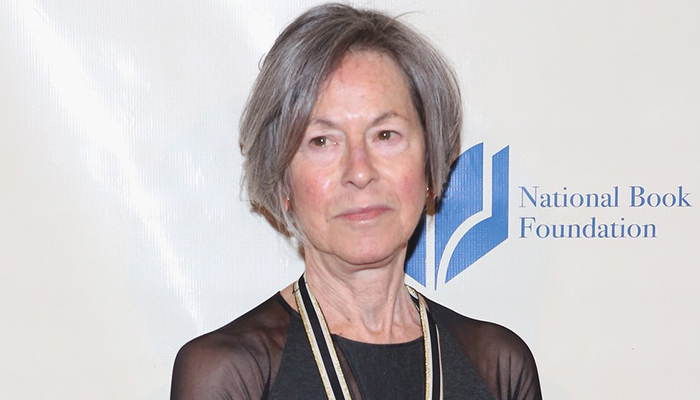American poet Louise Gluck wins Nobel Literature Prize
STOCKHOLM: American poet Louise Gluck won the 2020 Nobel Literature Prize on Thursday, an unexpected choice known for themes of childhood and family life that draw inspiration from myths and classical motifs.
Gluck, 77, was honoured "for her unmistakable poetic voice that with austere beauty makes individual existence universal," the Academy said.
Gluck won the Pulitzer Prize in 1993 for her collection "The Wild Iris" and the National Book Award for her latest collection, "Faithful and Virtuous Night", in 2014.
The Academy’s permanent secretary Mats Malm said he had spoken to Gluck just before making the public announcement.
"The message came as a surprise, but a welcome one as far as I could tell," Malm told reporters. Gluck was not seen as a favourite for the Nobel in the run-up to Thursday’s announcement -- though betting sites’ odds on her reportedly plunged just before Thursday’s announcement.
The chair of the Academy’s Nobel committee, Anders Olsson, lamented that she was not more well-known, "at least outside the US’ borders", and had not been translated into many other languages.
She is the fourth woman to win the Nobel Literature Prize in the past decade -- after Olga Tokarczuk, Svetlana Alexievich and Alice Munro -- and only the 16th since the Nobel prizes were first awarded in 1901.
A professor of English at Yale University, Gluck "seeks the universal, and in this she takes inspiration from myths and classical motifs, present in most of her works," the Academy said in its prize citation.
"The voices of Dido, Persephone, and Eurydice -- the abandoned, the punished, the betrayed -- are masks for a self in transformation, as personal as it is universally valid."
Her collections "The Triumph of Achilles" (1985) and "Ararat" (1990) address "almost brutally straightforward images of painful family relations", the jury said, noting that her use of a "deceptively natural tone is striking", with "no trace of poetic ornament."
Gluck is also a poet of radical change and rebirth, describing in her poem "Snowdrops" the miraculous return of life after winter, her work often marked by "humour and biting wit".
The jury said her 2006 collection "Averno" was a "masterly collection, a visionary interpretation of the myth of Persephone’s descent into Hell in the captivity of Hades, the god of death."
"She writes oneiric, narrative poetry recalling memories and travels, only to hesitate and pause for new insights. The world is disenthralled, only to become magically present once again," the Academy concluded.
Last year, the Swedish Academy gave the nod to Austrian novelist Peter Handke which unleashed a flood of criticism, as many wondered how it could award a writer known for supporting Serbian leader Slobodan Milosevic in the Balkan wars and playing down his army’s atrocities.
The Academy defended that choice as being made solely on literary merit without political considerations. The Nobel Prize comes with a medal and a prize sum of 10 million Swedish kronor (about $1.1 million).
Gluck would normally receive the Nobel from King Carl XVI Gustaf at a formal ceremony in Stockholm on December 10, the anniversary of the 1896 death of scientist Alfred Nobel who created the prizes in his last will and testament.
But the in-person ceremony has been cancelled this year due to the coronavirus pandemic and replaced with a televised ceremony showing the laureates receiving their awards in their home countries. So far this year, four women have won Nobel prizes, closing in on 2009’s record of five female laureates.
The four this year are, in addition to Gluck, Emmanuelle Charpentier of France and Jennifer Doudna of the US who shared the chemistry prize on Wednesday, and Andrea Ghez of the US who shared the physics prize with two male colleagues on Tuesday.
-
 Savannah Guthrie Sends Desperate Plea To Mom Nancy Kidnapper
Savannah Guthrie Sends Desperate Plea To Mom Nancy Kidnapper -
 NBA All-Star 2026 Shake-up: Inside The New USA Vs World Tournament Format
NBA All-Star 2026 Shake-up: Inside The New USA Vs World Tournament Format -
 Warner Bros Consider Reopening Deal Talks With Paramount, Says Reports
Warner Bros Consider Reopening Deal Talks With Paramount, Says Reports -
 Andrew Mountbatten Windsor Faces Future With UK MPs, Says Expert
Andrew Mountbatten Windsor Faces Future With UK MPs, Says Expert -
 Shamed Andrew Told 'nobody Is Above The Law' Amid Harrowing Silence
Shamed Andrew Told 'nobody Is Above The Law' Amid Harrowing Silence -
 Gisele Bundchen Melts Hearts With Sweet Bike Ride Glimpse Featuring Son
Gisele Bundchen Melts Hearts With Sweet Bike Ride Glimpse Featuring Son -
 Prince William Found Meghan Markle ‘quite Refreshing’ At Start
Prince William Found Meghan Markle ‘quite Refreshing’ At Start -
 Kate Middleton Knew Should Could Not Be ‘voice Of Reason’ With Prince Harry
Kate Middleton Knew Should Could Not Be ‘voice Of Reason’ With Prince Harry -
 Rihanna Has Wardrobe Malfunction At A$AP Rocky Fashion Show
Rihanna Has Wardrobe Malfunction At A$AP Rocky Fashion Show -
 Prince Harry Felt System Had ‘one Rule For Him, One For Prince William’
Prince Harry Felt System Had ‘one Rule For Him, One For Prince William’ -
 Jake Paul's Fiancée Sends Him Over The Moon Over Stunning Victory
Jake Paul's Fiancée Sends Him Over The Moon Over Stunning Victory -
 Harper Beckham Sends Valentine’s Love Amid Brooklyn Family Drama
Harper Beckham Sends Valentine’s Love Amid Brooklyn Family Drama -
 Why Prince William, Kate Middleton 'partnership' Is Important For Monarchy
Why Prince William, Kate Middleton 'partnership' Is Important For Monarchy -
 Katie Price Drama Escalates As Family Stays In Touch With Ex JJ Slater
Katie Price Drama Escalates As Family Stays In Touch With Ex JJ Slater -
 Critics Target Palace Narrative After Andrew's Controversy Refuses To Die
Critics Target Palace Narrative After Andrew's Controversy Refuses To Die -
 Sarah Ferguson’s Delusions Take A Turn For The Worse: ‘She’s Been Deserted’
Sarah Ferguson’s Delusions Take A Turn For The Worse: ‘She’s Been Deserted’




